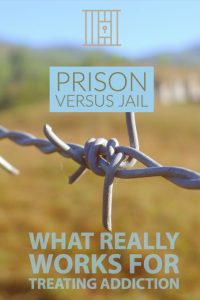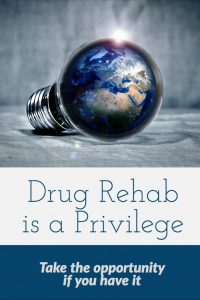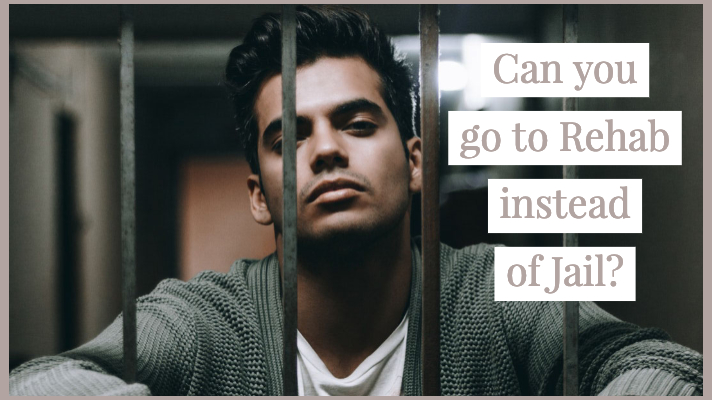Drug Rehab Instead of Jail
Many people ask me, “Can I go to drug rehab instead of jail?” If you have been charged with an offense, and alcohol and or drugs were a factor, in any way, there is a strong possibility that going to drug or alcohol treatment will keep you out of jail. The real question people seeking rehab versus jail should be asking me is, “How can I go to rehab so I don’t have to go to jail?”
Prison versus drug treatment is nearly the same as jail versus rehab. The only difference is that prisons are typically designed for long-term incarceration. Jails tend to hold people for shorter sentences.
There are two critical factors about being able to go to rehab instead of jail. The first is how you will pay for rehab (most pay with private insurance). Secondly, do you qualify for rehab versus prison? Both are important. If you’re not allowed to go to rehab versus jail, or you don’t have the ability to pay for rehab versus jail, then jail may be your rehab. That’s not the optimal situation.
Prison Possibility with Insurance
If you have an employer-based PPO Insurance policy, it should cover the cost of going to rehab, instead of jail
If you have an employer-based PPO Insurance policy, you should be able to get into rehab versus jail. The length of time is typically between 30-90 days. It could be for as long as 180 days. Most insurance plans participating in drug or alcohol treatment with come with a reasonable out-of-pocket cost. Sometimes, up to 100% of treatment is covered by an excellent employer-based PPO insurance policy.

The cash price for an accredited treatment center, approved by most courts, for you to go to substance, is somewhere between $50,000 to $100,000. This shocking cost is for 90 to 180 days. The best way to find out if your insurance will pay for treatment versus jail is to get your insurance verified by a treatment placement specialist like me.
If you have HMO insurance policy, your options are limited to avoid jail by going to rehab
If you have HMO insurance policy, your options are limited. With an HMO policy, you should use a Treatment Placement Specialist to find a treatment center that will be able to find you a rehab that will keep you out of jail. The reason is, for HMO policies, you must go to an in-network treatment center.
A small percentage of drug and alcohol treatment centers are in-network with any insurance company. The way treatment centers become in-network is by contracting directly with your insurance company. Typically this means they charge less per day, and the amount of days in rehab is significantly reduced. Therefore, using an HMO insurance policy to go to rehab versus jail is much more challenging. It can be done, but it’s like finding a needle in a haystack to find an in-network treatment center. Especially one that will allow you to stay long enough to go to rehab versus jail.
So definitely use a treatment placement specialist if you can.
Prison is Free, but Addiction Treatment is Expensive
Almost everyone I talk to thinks going to drug rehab instead of jail should be free. It’s not!
Almost everyone I talk to thinks going to rehab instead of jail is, or should be, free. Let me make this crystal clear: rehab that will keep you out of jail is not free. There are people who still think it’s free, State, or Federal programs. Government insurance will often not pay for rehab, versus going to jail.
Let me make this clear: in the hundreds of people I have worked with, not once have I seen this happen. Never have I come across a State or Federal Government medical insurance, like Medicaid, Medicare, etc., pay for substance abuse treatment that will allow someone to go to treatment rather than jail.
Rehab is not free. This is especially true when you’re seeking an accredited rehab. And guess what, most court-approved programs need to have accreditation if you’re going to attend as a substitute for jail time.
You are going to need either a good insurance policy (these are primarily employer-based policies) or $50,000 to $100,000 to pay for treatment that will keep you out of jail.
The Insurance Paradox of Being Clean or Sober
Insurance won’t pay for rehab if you have been off drugs for a short period.
This shocks people every time I have to explain it. Think about it from the insurance companies’ point of view. If you have been alcohol and drug-free for 10-30 days, in their minds, you don’t have a problem. Insurance companies consider this a valid reason to turn down paying for you to go to rehab versus jail.
Typically, you have to have been using drugs or alcohol no more than 48 hours prior to the day you go to treatment for insurance to pay for treatment. In these unique situations, it’s best to contact a treatment placement agent and let them help you find a way to get into rehab versus going to jail.
The Falsehood that It’s Cheaper for the State to Pay for Treatment
Isn’t it cheaper for the government to pay for treatment versus putting someone in jail?
NO!

No, it is not! It’s a myth that it’s cheaper to put someone in drug treatment instead of jail. In 2017, the average cost to house a prisoner for one year was $32,300 per year. A month in a licensed, accredited substance abuse treatment center can cost over $30,000 for a month of treatment. It can cost up to $100,000 or more for 90 to 180 days of treatment. So no, you’re not saving the state any money by taking treatment versus prison.
As a side note, because rehab is not jail, you can walk out at any time
Now that I have made it crystal clear that you will have to have a good employer-based insurance policy or $50,000 – $100,000 to go to treatment versus jail, let’s discuss when and in what instances you can make this happen.
Real Life Case Scenarios
Who’s eligible:
- DUI offenders
- People who fail required probation urine tests
- People arrested for possession or sale of small amounts of illegal substances
- Any instance where substance abuse was a factor in a person’s arrest
- Any person arrested who seeks treatment prior to their court hearings.
The key is to seek treatment IMMEDIATELY. It can only help, never hurt. Today, I got a call from a person seeking treatment who had just been sentenced to prison. After talking with the caller, I found out that the person seeking treatment was convicted a few days ago. They hadn’t used any substances for six months because they had an ankle monitor. So, on point one, there was no way insurance would pay for rehab because they were six months clean. Point two, they lost the option with the court to go to rehab versus jail because they waited until they were convicted and sentenced.
You need to seek treatment as soon as you are arrested before it’s too late.
DUI’s and Prison
If I had a dollar for every first-time DUI offender who, while waiting to go to court for their first DUI, got another alcohol-related offense, I wouldn’t have to work anymore.
Even people who have never had a drinking issue before commonly get a second offense while out on bail from the first offense. They are depressed about their situation, feel overwhelmed and anxious, and turn to alcohol. They go out drinking with a friend who drives, and they think there’s no danger. The friend gets pulled over for DUI, and then the passenger gets drunk in public. Or worse, it is more common than you think for someone to get a DUI while awaiting court on a prior.
Crime on bail offenses are far more serious than if the crime happened sometime in the future.
Crimes Involving a Firearm
People arrested for crimes that involve a gun are rarely allowed to go to treatment versus jail. However, there are exceptions. It’s best to contact a treatment placement agent and discuss your unique situation. When it comes to going to treatment versus jail, you need an expert to help. You need to know which treatment centers the court will accept as an alternative to going to jail and which treatment centers the court won’t accept in lieu of going to jail.
Bond Restrictions may affect where and when you can go to treatment. Some bonds don’t let you leave the city, county, or state you live in. Before you call a treatment placement agent for help, get a copy of your bond restrictions (if any) to discuss rehab options for your unique situation.
Positive Attitudes and Addiction Treatment
Never give up hope trying to get into rehab versus jail. Today, a young man called me in a panic. He knew he would fail his urine analysis at his probation appointment today. I suggested since he was covered by his mother’s medical insurance policy that, he should enter treatment today, and he agreed.

I got him a letter from a highly accredited treatment center that he was approved for inpatient substance abuse treatment. He sent the letter to his probation officer and told the probation officer the truth. He said that he would fail his urine analysis today. He asked permission to go to treatment, and it was granted.
The Bottom Line
In summary, going to rehab versus jail is a complex issue. There is hope, and there is help. I have placed hundreds of people in rehab that would have gone to jail if they didn’t go to rehab. Please call me at 800 673-5950 if you need help for yourself or a loved one.
About the Author Bruce Berman
He has personally assisted several hundred people in treatment for alcohol, substance abuse, and dual diagnosis. He has maintained continuous recovery from various addictions since September 1989. Besides himself, he has placed his own children, employees, family members, friends, and other loved ones into various treatment programs. Whether you are struggling with addiction or a loved one is most likely the author has dealt with a similar situation. Bruce is a father of four children ages 15 to 38 and happily married to his wife Victoria, who has also been in recovery since November 1995. Together, Bruce and Victoria run 800 Recovery Hub a company that specializes in placing people needing treatment into the best treatment center they can.
DISCLOSURE
Bruce Berman is not a medical doctor, holds no degrees or licensees in addiction and has no formal education in treating addiction. He relies solely on his personal experience gained in attending and participating in over 10,000 hours in various 12 step meetings since 1989 as well as the experience he has working with addicts and their families since 1989.
